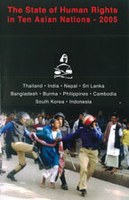 Asia’s people continue to suffer from the endemic use of torture and other violent practices that deny them their basic human rights and, at the same time, an absence of the rule of law. The former flourish because of the latter. These conclusions are well documented in the book The State of Human Rights in Ten Asian Countries-2005 that the Asian Human Rights Commission (AHRC) has released on Jan. 17, 2006, in Hong Kong. The book is the product of comprehensive research conducted during the past year by the AHRC on human rights conditions in Bangladesh, Burma, Cambodia, India, Indonesia, Nepal, the Philippines, South Korea, Sri Lanka and Thailand that was prepared for International Human Rights Day on Dec. 10, 2005.
Asia’s people continue to suffer from the endemic use of torture and other violent practices that deny them their basic human rights and, at the same time, an absence of the rule of law. The former flourish because of the latter. These conclusions are well documented in the book The State of Human Rights in Ten Asian Countries-2005 that the Asian Human Rights Commission (AHRC) has released on Jan. 17, 2006, in Hong Kong. The book is the product of comprehensive research conducted during the past year by the AHRC on human rights conditions in Bangladesh, Burma, Cambodia, India, Indonesia, Nepal, the Philippines, South Korea, Sri Lanka and Thailand that was prepared for International Human Rights Day on Dec. 10, 2005.
The nexus between the rule of law and the actual realisation of human rights is not something to which the global human rights community has paid sufficient attention. The result is that while enormous attempts have been made to propagate the basic ideas of human rights, as enshrined in the 1948 Universal Declaration of Human Rights (UDHR) and other covenants and conventions adopted by the international community under the sponsorship of the United Nations, the effort to create the conditions that are necessary for the actual realisation of human rights compares very poorly with the hard work that has been undertaken to create an awareness of human rights. The result is that people whose rights are so blatantly and continuously violated ask their governments as well as the United Nations, “Where are my rights?” To this question, neither the governments nor the United Nations and the international community are able to give a satisfactory answer as of now.
The Asian Human Rights Commission (AHRC) calls upon the peoples of Asia, as well as all others concerned with the actual realisation of human rights, to pay special attention to the link between the rule of law and human rights. Finding ways to resolve this contradiction is the path that has to be treated if human rights are to be a practical reality. As a symbolic means of stressing this issue and keeping it alive for discussion in the immediate future, the AHRC has launched an Asian Charter on the Rule of Law. This effort is a follow-up to AHRC’s earlier effort to work towards drafting a People’s Charter on Human Rights. We urge everyone to support this effort and to make the theme of improving the rule of law for the achievement of human rights a central theme of engagement in the coming year.
This publication is a collection of reports launched by the Asian Human Rights Commission regarding the human rights situation in ten Asian countries on the occasion of international human rights day, December 10, 2005.
These country reports have been made from the perspective of human rights implementation, as mentioned in article 2 of the International Covenant on Civil and Political Rights (ICCPR). While the ratification of international covenants have improved in the region, the situation of human rights is continuing to deteriorate. This is due in large part to the failure of state parties to take steps required by article 2 of the ICCPR.
Torture remains endemic in the region, and rule of law has seen serious setbacks. The reports collected here record the manner in which the lives of people are affected by limitations in the rule of law and the incapacity of states to ensure people’s enjoyment of rights.
Published in December 2005 by the Asian Human Rights Commission (AHRC), 169 pages, Language: English;
ISBN-10: 962-8314-26-2, ISBN-13: 978-962-8314-26-3; PID: AHRC-PUB-004-2005
For orders and enquiries: Email ahrc@ahrc.asia or call +(852) 2698 6339 +(852) 2698 6339.
Click here to download this publication in PDF format.